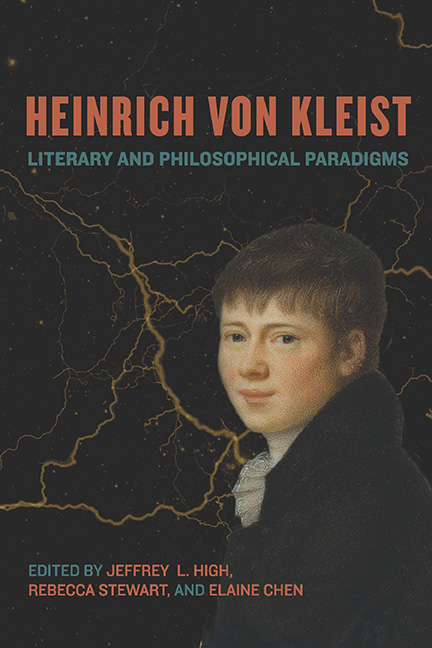3 - The Mereau-Brentano Translations of María de Zayas’s “Spanish Novellas” and Kleist's Prose Works
Published online by Cambridge University Press: 26 May 2022
Summary
THE DEGREE TO WHICH the novellas of María de Zayas y Sotomayor (ca. 1590–1661) informed the style and content of the prose works of Heinrich von Kleist (1777–1811) has not been previously investigated. Although there is no direct indication in Kleist's letters that he was familiar with her works, due to the prominence of Zayas's translators Sophie Mereau (1770–1806) and Clemens Brentano (1778–1842) on the Berlin literary scene there can be little doubt that Kleist was aware of their German translations of Zayas's novellas, published in 1804 and 1806. As is demonstrated below, Kleist was not merely aware of the translations; in fact, his prose works draw heavily on the thematic and stylistic repertoires of the Mereau-Brentano translations of Zayas's novellas.The validity of studies on the metatextual presence of seventeenthcentury Spanish texts in Kleist's works, for example, those by Cervantes (1547–1616) and Calderón (1600–1681) as well as the presence of Rousseau (1712–1778), C. M. Wieland (1733–1813), and Schiller (1759–1805), among others, has long been recognized. A close reading of select Mereau-Brentano translations of Zayas's texts demonstrates a striking paradigmatic presence in a series of transtextual relationships to the works of Kleist. The following is intended as a comprehensive introduction to what is no doubt a more complicated topic.
Kleist, Translation-Adaptation, and María de Zayas
Kleist—for all his originality—was a serial adapter and recycler of phrases and motifs he stylized into what Thomas Mann (1875–1955) called “exzentrisch[e] Stoffe bis zur Tollheit, bis zur Hysterie” (eccentric plots bordering on madness and hysteria), leading Mann to declare Kleist and his works “überhaupt sondergleichen” (indeed without equal) and “völlig einmalig” (utterly unique). Distinctive plots in Kleist's prose works include, for example, tales of societal crisis, sexual violence, military occupation, usurpation, vengeance, deception, and ghost-hunting; often informed by episodic motives including incest, murder, disguise, mistaken identity, and cross-dressing; all of these punctuated by devices such as fainting, falling, and failure to comprehend or communicate. Important elements of Kleist's style include the employment of eccentric variations of punctuation and conjunction traditions, variations that he made iconic through repetition, as he did with radically hypotactic sentence structures and distinctive uses of words and phrases that to date ring unmistakably Kleistian.
- Type
- Chapter
- Information
- Heinrich von KleistLiterary and Philosophical Paradigms, pp. 52 - 95Publisher: Boydell & BrewerPrint publication year: 2022



